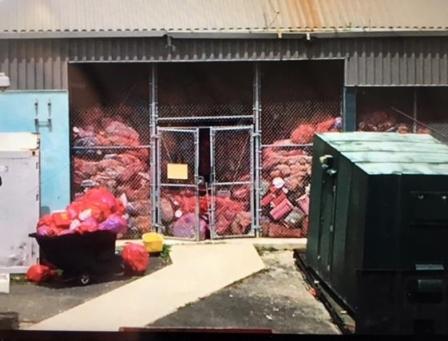News Releases from Headquarters
EPA Hurricane Maria Update for Wednesday, October 4, 2017
WASHINGTON (October 4, 2017)—The U.S. Environmental Protection Agency (EPA) continues to coordinate closely with federal, commonwealth, territory, and local partners as the Agency responds to the impact of Hurricane Maria. EPA is supporting the Federal Emergency Management Agency (FEMA) through its assistance to the governments of Puerto Rico and the U.S. Virgin Islands (USVI).
EPA is focused on environmental impacts and potential threats to human health as well as the safety of those in the affected areas. EPA is continuing to coordinate with local governments in Puerto Rico and the USVI to assess the conditions of drinking water, which includes sampling, analysis and lab support, and getting wastewater treatment systems up and running. EPA’s missions also include oil and chemical spill response, oil and chemical facility assessments and debris management.
Assessment of Superfund Sites, Oil Sites and Regulated Facilities
EPA also continues to re-assess Superfund sites, oil sites, and chemical facilities in both Puerto Rico and the USVI to determine if the sites were affected by Hurricane Maria and if there is a potential for contamination to cause off-site impacts. We have conducted preliminary assessments at five Superfund sites and one oil response site. Additional sites have been prioritized for assessment.
Debris Management
EPA is working on debris management with FEMA, the U.S. Army Corps of Engineers and the Puerto Rico and USVI governments and continues to develop options for the management of vegetative materials, hazardous waste, construction debris, wet debris, and household hazardous waste in Puerto Rico and the USVI.
EPA conducted an inspection of a hospital waste storage area on St. Croix where approximately 50,000 pounds of waste requires packaging and disposal.
Drinking Water and Wastewater Management
- USVI:
- EPA is working to get labs back on line so that environmental samples can be locally analyzed.
- EPA continues to coordinate drinking water sampling with the U.S. Virgin Islands Department of Natural Resources. Samples are taken to the Ocean Systems Lab on the island of St. Thomas for bacterial analysis.
- Puerto Rico:
- EPA is working closely with the Puerto Rico government, including the Puerto Rico Aqueduct and Sewer Authority (PRASA) and non-PRSA systems, to prioritize which systems or parts of systems to address first and how best to proceed. PRASA provides drinking water to 96 percent of the people in Puerto Rico.
- The EPA has water experts and emergency responders who are focused on assessing both drinking water and wastewater systems.
- EPA assessments indicate that more than one-third of Puerto Rico’s sewage treatment plants are non-operational. Wastewater treatment plants, pipes and pumps were either severely damaged during the recent hurricanes and flash floods, or are not functioning due to loss of power. As a result, raw sewage is being released into waterways in Puerto Rico, including some coastal waters, streams and rivers. This situation is expected to continue in some areas until repairs can be made and power is restored.
Water Safety
Water contaminated with livestock waste, human sewage, chemicals, and other contaminants can lead to illness when used for drinking, bathing, and other hygiene activities. According to the Centers for Disease Control and Prevention (CDC), people should not use the water from rivers, streams and coastal water to drink, bathe, wash, or to cook with unless first boiling this water for a minimum of one minute. If boiling the water is not possible, water may be disinfected with bleach. To learn more about making water safe in an emergency, go to CDC’s Making Water Safe in an Emergency web page.
Personnel as of October 4, 2017
- About 174 personnel are currently involved in hurricane response efforts.
- About 27 personnel are on the ground in USVI to assist with response efforts.
- About 57 personnel are on the ground in Puerto Rico to assist with response efforts.
EPA has important resources available online in English and Spanish about floodwaters, hazardous debris, household hazardous waste, and other hurricane impacts. EPA will continue to provide regular updates about EPA’s response to Hurricane Maria. For information and updates, visit: www.epa.gov/hurricane-maria.
###

